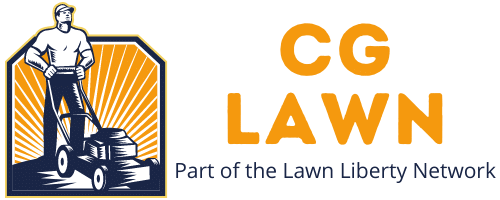If clover (Trifolium repens) is popping up in your yard and creeping across it in patches, there are simple, effective ways to naturally get rid of clover from lawns.
I’ve tried several different ways to eliminate clover from my lawn but the most effective11 natural remedies to kill clover in your lawn include:
- Spray a vinegar solution
- Use nitrogen
- Spread cornmeal gluten
- Apply an organic herbicide
- Use an organic nitrogen-rich fertilizer
Read on to find out how to implement these solutions in detail.
11 Natural Ways to Get Rid Of Clover in Lawn
Once you see clover growth in your grass, getting rid of it as soon as possible is important if you don’t want it spread like crazy throughout the rest of your landscape. Remember, though, that these remedies may take a little more time to work effectively or require numerous applications over a couple of weeks.
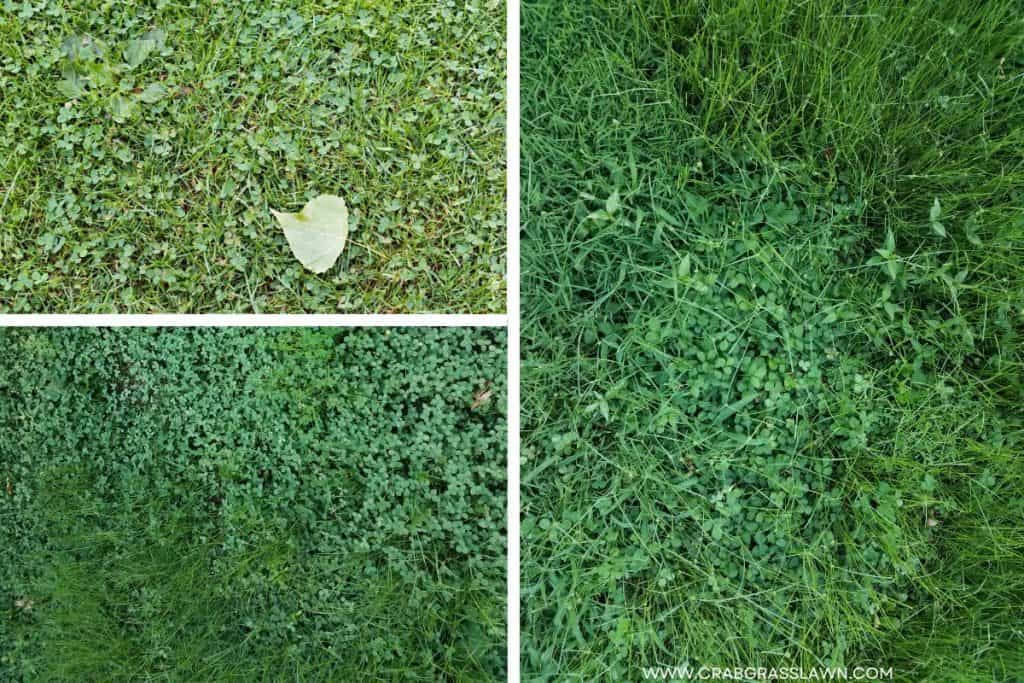
Get Rid of Clover in Your Lawn With Products
When using products to eradicate clover plants, always check to see if they will damage the grass too, and follow the recommended directions closely.
#1 – Spray a Vinegar Solution
One of the most common ways to get rid of clover is to use a vinegar solution on the weeds. To make the solution, mix one cup of vinegar, one cup of water, and a couple of drops of biodegradable dish soap in a spray bottle. (Some people also add Epsom salts.) Shake it up to mix the ingredients, then spray it on your clover patches.
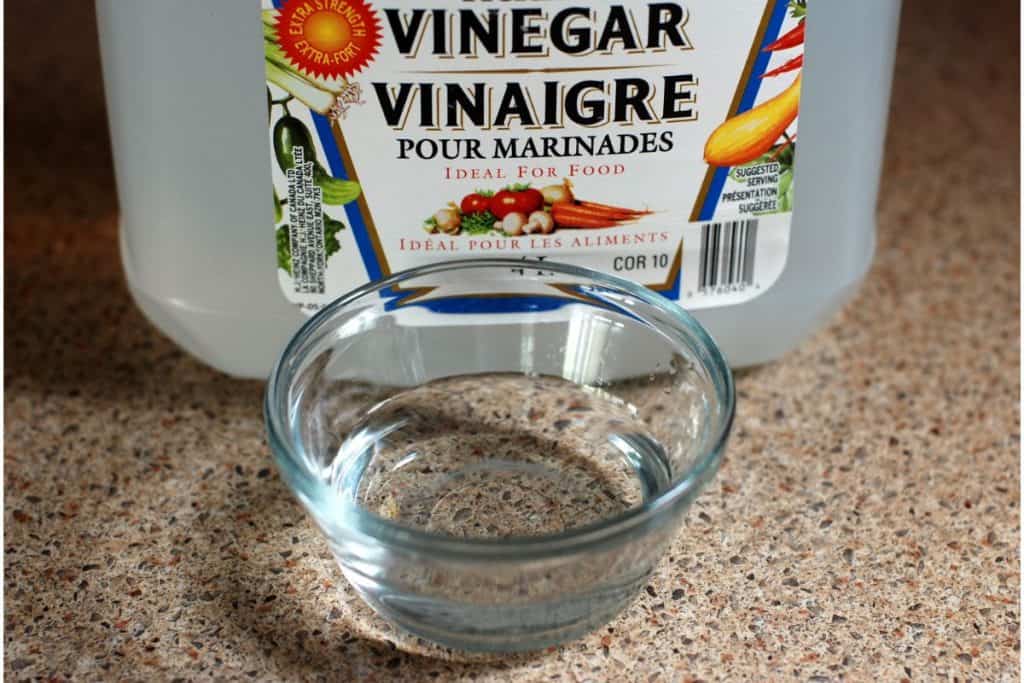
The dish soap acts as a surfactant, helping the mixture stick to the foliage, so the vinegar can dry out the leaves, killing the plant. You may need to spray the solution numerous times over a few weeks for the plants to die.
Keep in mind that when using this method, the mixture will also harm anything else it touches, so spray when there is little wind and be careful to keep it off nearby plants you want to keep. Here are a few tips for using vinegar as a herbicide.
#2 – Use Nitrogen
Another way to get rid of clover is to use ammonia, a form of nitrogen, to “burn” the plants. Apply ammonium sulfate—which leaves your grass unharmed—one day after it rains, following label instructions. Repeat once a month as needed.
Since clover makes its nitrogen, applying ammonium sulfate gives the plants too much, which is ultimately toxic. Never use household ammonia (which is technically ammonium hydroxide) as this is dangerous to humans and pets.
#3 – Spread Corn Meal Gluten
Corn meal gluten has been used as a natural pre-emergent herbicide for many years. When applied, it releases organic dipeptides that dry out the seeds, so they have trouble sprouting. Use about 20 pounds of corn gluten per 1,000 square feet of grass for the best results.
Dr. Nick Christians was researching a pathogen commonly found on golf courses and unintentionally discovered corn meal gluten controls grassy and broadleaf weeds similar to chemical pre-emergents. After further research, corn gluten meal was patented as a natural, organic herbicide in the early 1990s.
#4 – Use an Organic Herbicide
For homeowners looking for an organic product to combat clover, you should look into a product known as A.D.I.O.S. Organic Herbicide and Weed Killer.
The abbreviation stands for “Advanced Development in Organic Solutions.” Spray this non-toxic, odorless selective weed killer directly on any unwanted weeds. A.D.I.O.S. works by pulling water from the plant cells, rapidly drying out the plant, so it dies.
A.D.I.O.S. is one of the few, if not the only, selective organic herbicides that target weeds but won’t harm your turfgrass. Most organic weed products are non-selective and destroy anything they contact, including turf.
#5 – Use an Organic Nitrogen-Rich Fertilizer
If you are tackling a small amount of clover, you may be able to get rid of it by using an organic, slow-release fertilizer that is rich in nitrogen. Similar to using ammonium sulfate, the clover doesn’t like the additional nitrogen. Some of the best organic fertilizers with high nitrogen content include cow manure, bat guano, bone meal, blood meal, liquid kelp, and earthworm castings.
In the long run, you’ll also see healthier grass growth.
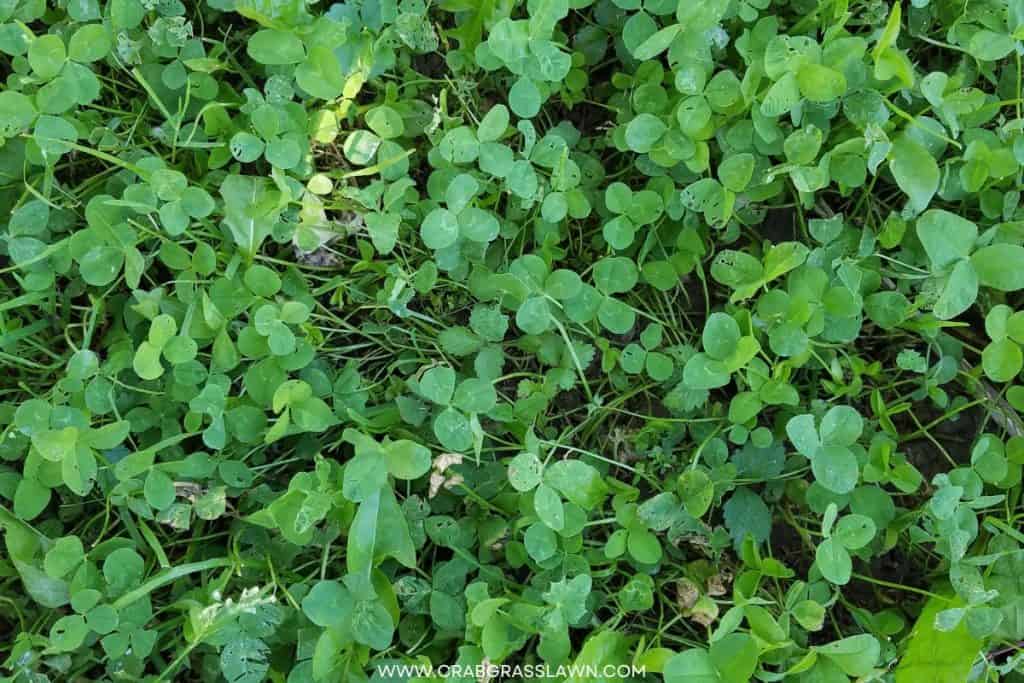
Get Rid of Clover in Your Lawn Manually
Beyond using products to wipe out clover, you can always manually get rid of it.
#6 – Mow Your Lawn High
While this is part of a proper lawn care regime, it is also effective in removing clover from your yard. Clover naturally grows low to the ground with a shallow root system. If you raise the blade height on your mower deck to at least 3 inches tall when mowing and leave it there for a handful of cuttings, the taller turfgrass will block the sun from reaching the low-growing clover. Without sunlight, the clover will die.
#7 – Pull the Clover Out By Hand
Pulling plants by hand is a tried-and-true option that stops clover from spreading throughout your yard. As soon as you notice small clumps, loosen the ground around the base of the plant with your fingers or garden spade, and then pull the plant out, making sure to get the entire root system.
If it’s hard to pull, try watering thoroughly beforehand to help loosen the clover roots.
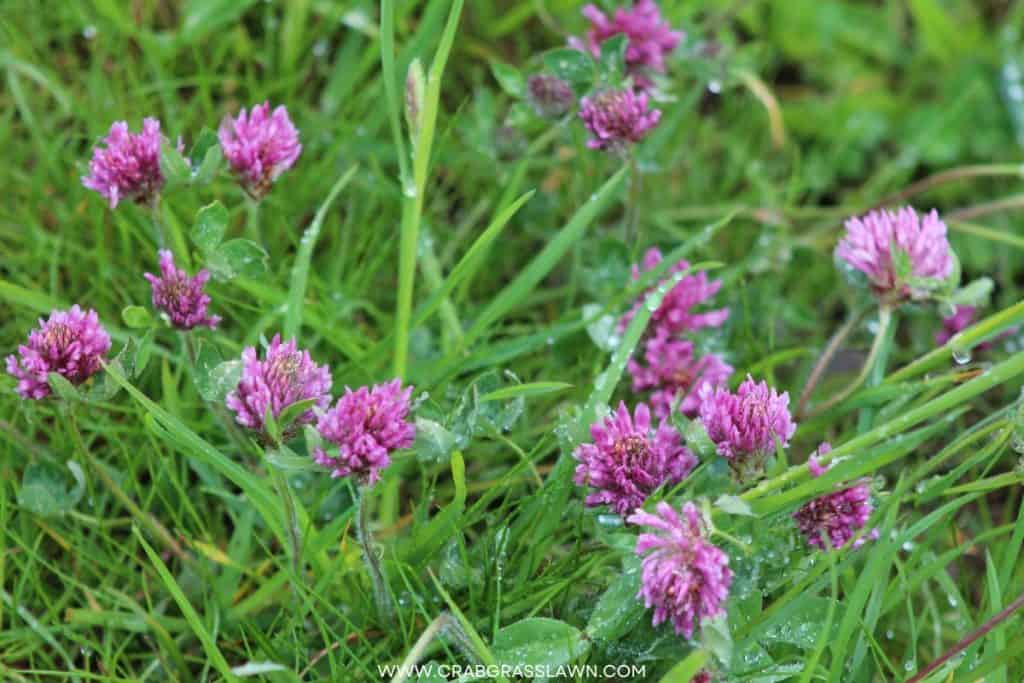
#8 – Deprive It of Oxygen and Sunlight
If you have large patches you need to get rid of, one of the most effective ways to do this naturally is to deprive the entire patch of sunlight and oxygen. Place plastic sheeting or a garbage bag on top of the clover, securing the corners into the ground, so it doesn’t blow away. In a few weeks, everything that was once growing in that spot should be smothered out and dead.
Remember, though, a plastic sheet will eliminate everything underneath it, so any grass growing there will also experience collateral damage.
#9 – Water Your Lawn Properly
Keeping your lawn so it isn’t too wet or too dry is a fantastic way to discourage clover from growing. When your turf is too wet, it’s the perfect habitat for weed seeds to germinate. But if your turf is too dry and stressed, it invites clover to grow too.
Generally, giving your entire yard an infrequent yet deep watering a couple of times a week is recommended, providing about an inch of water weekly. This amount varies slightly depending on your soil type and grass variety but is a good rule overall.

#10 – Seed Bald Spots
Clover is known to take advantage of any empty space, including bare spots on your turf. To prevent the growth of clover weeds in these patches, always sow grass seeds on bare spots immediately and cover the patch with a thin layer of mulch. Getting new turf growing quickly will help keep clover at bay.

#11 – Improve the Soil Fertility
Clover, as well as many other weeds, grows well in infertile soils. Hence, you often see weeds covering the ground at construction sites or along roadsides. They tend to flourish in spots like this because they have adapted to grow in poor soils, where other plants struggle. Especially clover, since it produces nitrogen from air and prefers nutrient-poor soils.
In general, proper lawn care, especially when it comes to fertilizer applications, will help to keep weeds at bay naturally. Ensuring your soil has adequate levels of nitrogen gives you an extra advantage over clover. A slow-release fertilizer is excellent at maintaining steady nitrogen levels throughout the entire season.
What Is Clover?
Most people are familiar with the quintessential purple or white flowers of clover and its sweet smell. Most of us have also spent time searching for a symbolic green four-leaf clover considered to be a symbol of love, hope, faith, and good fortune.
As defined in the New World Encyclopedia, “clover, or trefoil, is the common name for any of the various herbaceous, leguminous plants comprising the genus Trifolium in the pea family Fabaceae, typically characterized by trifoliolate leaves (having three leaflets) and heads or dense spikes of small red, purple, white, or yellow flowers.”
In simple words, clover is the common name for plants in the pea family with three leaflets and small colored flowers. They are nitrogen-fixing plants that make their own nitrogen and die back to the soil surface when temperatures drop in the fall, regrowing from their roots the following spring.
Clover is important in agriculture as a livestock feed or cover crop across temperature and subtropical areas worldwide, including North and South America. Before chemical herbicides became popular, you could find them in many lawns. Now it is typically considered a nuisance perennial weed by many homeowners.
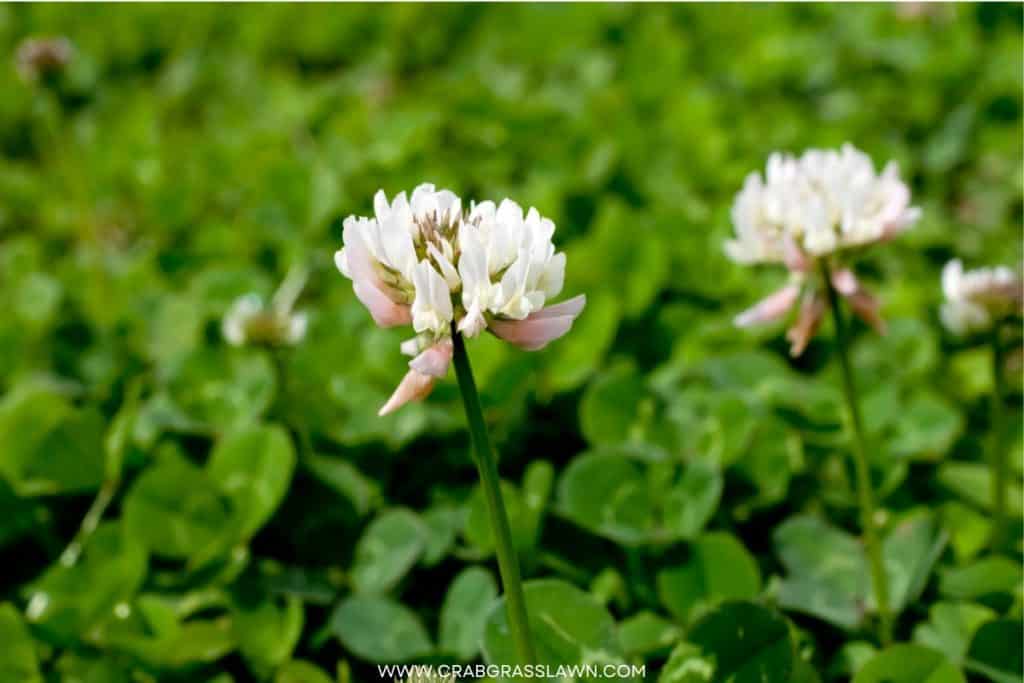
Why Do I Have So Much Clover In My Lawn?
There are different reasons you may have clover sprouting up throughout your lawn (or garden). The truth, though, is the reasons are typically related to your soil. When you have clover, it is a sign you have problems that need remedying.
- Acidic pH: Most turfgrasses prefer an ideal soil pH between 6.0 and 7.0 for optimum growth. When the pH drops below this range and becomes more acidic, it’s harder for grass to grow because of the pH’s effect on nutrient availability. However, clover thrives in poor environments, including acidic soils.
- Inadequate or Poor Nitrogen Levels: Nitrogen is needed by all plants to grow. Grass gets it from the soil, while clover can make its own from the air. If there is a lack of nitrogen in the soil, grass struggles to grow, but clover thrives.
- Compacted Soil Layers: Over time, soil compaction keeps nutrients, air, and water from moving into the root zone where your turf can access these needed resources. As the turfgrass becomes stressed and thins, this creates the perfect opportunity for the clover to grow.
Why Kill Clover in Your Lawn?
Coupled with quackgrass, crabgrass, and dandelions, clover rounds out the most common lawn weeds list. If you don’t want it in your landscape, it’s imperative to get rid of it immediately because it is considered highly invasive. It has an aggressive spreading habit that allows a single plant to multiply in size and take over your yard and flower beds quickly.
For more information, check out my detailed guide on the reasons to avoid a clover lawn.
How to Kill Clover Using Herbicides
Some homeowners opt to use chemical (i.e., synthetic) herbicides to kill actively growing weeds or prevent clover from growing. Chemical control methods can be a very effective weed killer when used properly, so it warrants talking about them quickly.
There are two different approaches to killing clover, differing in timing.
- Apply a product that kills the plants actively growing in your yard.
- Apply a product that inhibits clover seed germination, so the clover can’t sprout and take hold.
Killing Actively Growing Clover with Post-Emergent Herbicides
Post-emergent synthetic herbicides are one of the most effective clover control methods. This news might not be favorable for homeowners who prefer a more natural approach to lawn care, but unfortunately, it’s the truth.
They work to destroy actively growing weeds by either attacking the foliage or making their way through the plant’s vascular system to destroy the roots. Selective herbicides are carefully formulated to control specific types of weeds (e.g., clover) or weed categories (e.g., broadleaf plants), so they won’t harm your grass when applied correctly.
The following 4 broad-leaved herbicides are highly recommended on Amazon if you are looking for a highly effective post-emergent product for controlling clover. They are all selective formulas formulated to target actively growing clovers and other broadleaf weeds.
| Preview | Product | Rating | |
|---|---|---|---|
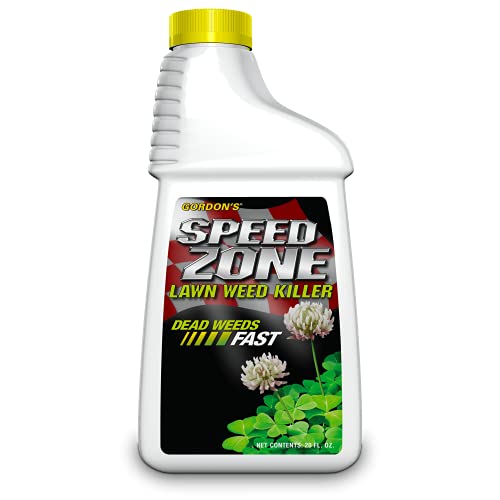
|
Gordon’s SpeedZone Lawn Weed Killer, 20 Ounces, 652400 | 3,363 Reviews | Check Price |

|
Ortho Weed B-gon Chickweed, Clover & Oxalis Killer for Lawns... | 6,070 Reviews | Check Price |

|
Tenacity Turf Herbicide - 8 ounces (Packaging may vary) | 8,881 Reviews | Check Price |

|
Southern Ag Amine 2,4-D WEED KILLER, 32oz - Quart | 6,586 Reviews | Check Price |
Affiliate links and images pulled from the Amazon Product Advertising API on: 2024-04-18
Preventing Clover with Pre-Emergent Herbicides
Pre-emergent products work differently than post-emergents and are applied as their name states—before the clover emerges. They are a helpful tool in fighting common weeds but aren’t as effective as post-emergent broadleaf herbicide applications.
A common misconception, though, is how these herbicides work. They are called pre-emergents for a reason versus pre “germination”. They do not kill weed seeds before they germinate. Instead, they work by inhibiting cellular division in the sprout, keeping the radicle from developing further or the initial leaf from developing. So they halt germination, stopping sprouts from pushing through the soil surface.
Pre-emergent products work best when applied to the entire lawn in early spring before seeds germinate. You want the soil temperatures between 50 and 55°F for five consecutive days, typically in late March or early April.
When combined with other methods, the following products help control clover very well.
| Preview | Product | Rating | |
|---|---|---|---|

|
Tenacity Turf Herbicide - 8 ounces (Packaging may vary) | 8,881 Reviews | Check Price |

|
DOW Snapshot 2.5 TG Granular Pre-emergent Herbicide | 328 Reviews | Check Price |

|
Gallery Turf Pre-emergent Herbicide - 1 Pound Bottle | 8 Reviews | Check Price |
Affiliate links and images pulled from the Amazon Product Advertising API on: 2024-04-19
Unfortunately, many of the well-known turfgrass fertilizer companies’ standard “weed and feed” pre-emergent products will not affect clovers.
There also isn’t a good selection of organic pre-emergent herbicides that help prevent clover.
Check out this video from Ryan Knorr on how to kill clover the cheap way:
Best Clover Killer For Lawns?
Overall, the best three synthetic products from Amazon are the following.
- Gordon’s SpeedZone Lawn Weed Killer
- Southern Ag Amine 2,4-D Weed Killer
- Tenacity Turf Herbicide (which can be used as a pre and post-emergent product)
| Preview | Product | Rating | |
|---|---|---|---|

|
Gordon’s SpeedZone Lawn Weed Killer, 20 Ounces, 652400 | 3,363 Reviews | Check Price |

|
Southern Ag Amine 2,4-D WEED KILLER, 32oz - Quart | 6,586 Reviews | Check Price |

|
Tenacity Turf Herbicide - 8 ounces (Packaging may vary) | 8,881 Reviews | Check Price |
Affiliate links and images pulled from the Amazon Product Advertising API on: 2024-04-18
A.D.I.O.S. is also a fantastic all-natural herbicide that won’t harm your grass but is more expensive and needs to be purchased from other retailers.
Best Time To Spray Clover In Lawns?
The best time to spray clover is when plants are young and small. Most of the time, this occurs in early spring as your grass comes out of dormancy and begins its active growth for the season. Treating smaller plants is easier than mature clover with an extensive root system.
You can spray clover any time during the growing season, but more established plants may need repeated applications before seeing the desired results.
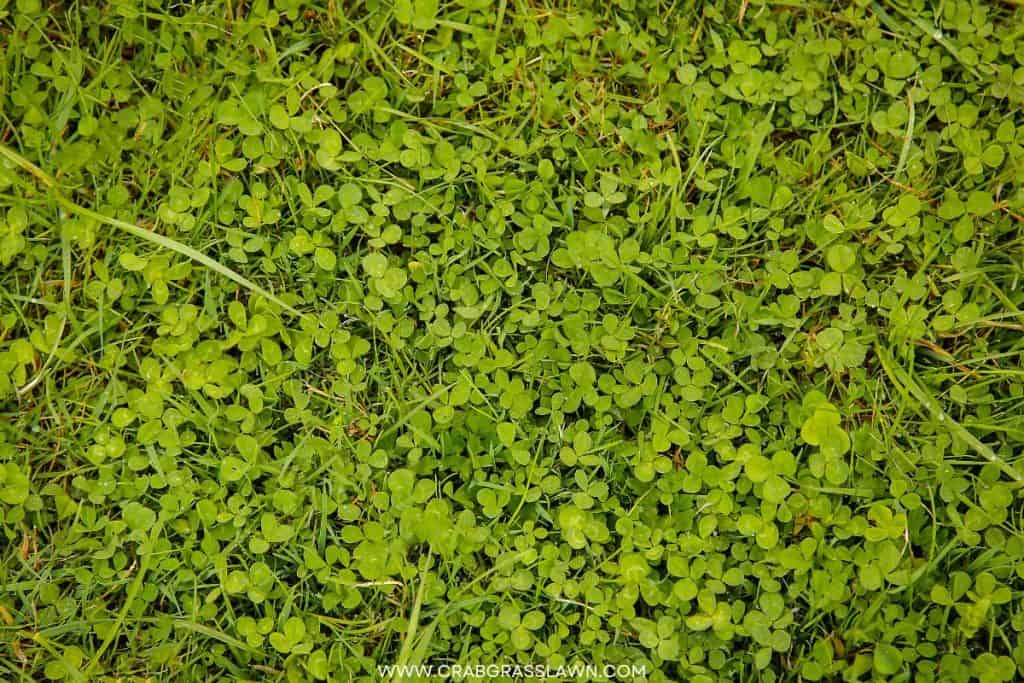
How Often To Apply Clover Killer?
Since clover is such a persistent weed—mainly due to its expansive, deep root system—you may need to apply clover killer more than once. After an initial application, wait 4-6 weeks before treating again.
Preventing Clover with Proper Lawn Care and Maintenance
One of the best ways to prevent patches of clover in your yard is to maintain healthy grass. When your grass is stressed or you have bare soil spots, it makes it easier for weeds—clover included—to come in and claim the real estate. But when your lawn is healthy, the competition from grass is too much for many invasive weeds.
Your lawn care program doesn’t need to be extensive and challenging to keep weeds from invading. A simple program like the following is enough to maintain a healthy, thick lawn that naturally prevents clover, dandelions, etc., from establishing.
According to Scotts, the best lawn care for preventing weeds consists of three main facets.
- Mow your grass higher, so it naturally shades the soil, keeping clover from germinating. The specific mowing height depends on individual grass types.
- Feed your grass regularly, so it stays thick and healthy.
- Water your grass infrequently yet deeply, so it’s more drought-tolerant and able to out-compete weeds.
Why You Might Want to Keep Clover on Your Lawn
To play devil’s advocate for a second, before you immediately react to seeing clover in your yard and killing it, keep in mind there are some benefits of clover.
- Clover is part of the pea family, a group of plants that make their own nitrogen, negating the need for additional fertilizer. It forms a symbiotic relationship with beneficial soil bacteria that allow it to use atmospheric nitrogen for growth. Because of this, it can improve poor fertility levels and help make your lawn greener and thicker.
- Clover has a dense root system that helps to crowd out existing weeds and prevents other weeds from germinating. It also creates a thick mat casting shade over the ground’s surface. This lack of sunlight makes it harder for other weeds to compete with the grass.
- Clover roots create an incredible network, helping to break up existing soil compaction. In turn, it reduces the need for regular lawn aeration.
- Clover blossoms are a favorite of bees and pollinators, which can improve pollination in garden plants and fruit trees.
- Clover is resistant to dog urine. It doesn’t develop the typical yellow discoloration in lawns.
Curious to learn more? Check out my full article on the benefits of a clover lawn.
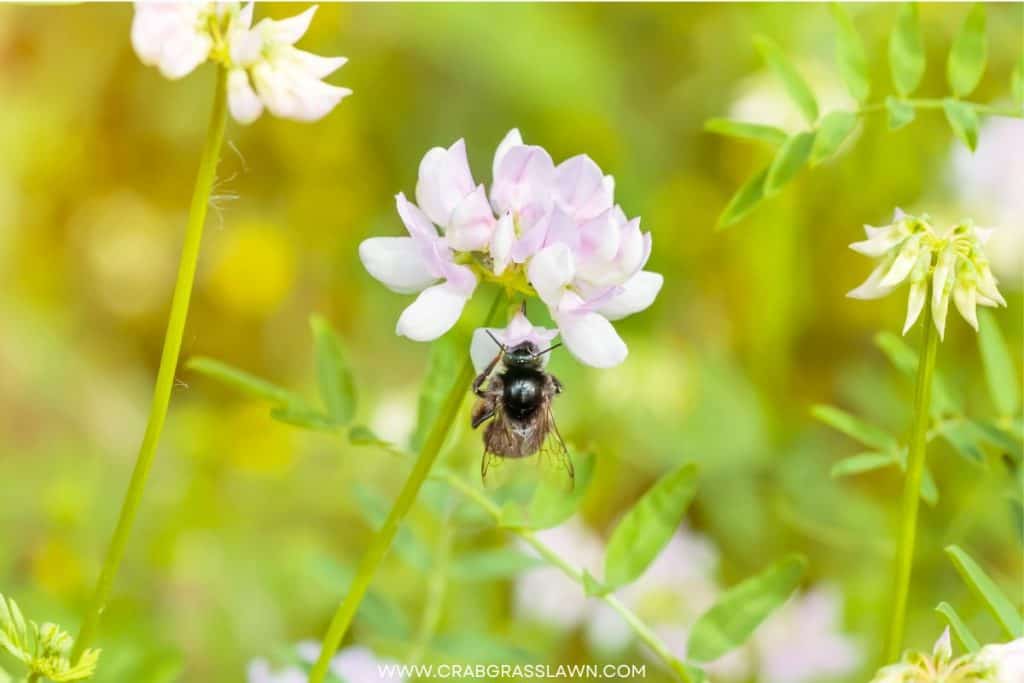
FAQs
Q. What Will Kill Clover but Not Grass?
A. Some products will get rid of nuisance clover but not the grass. Corn gluten meal, selective broadleaf herbicides, and products like A.D.I.O.S herbicide all work to get rid of trefoil without harming your turf. If you are buying chemical products, always double-check the label to ensure it’s safe for turfgrass use.
Q. Is White Clover Good for a Lawn?
A. While it may appear unsightly to some homeowners, white clover offers many advantages for lawns. It “fixes” its nitrogen, helps to break up compacted soil, and can deter many lawn pests.
Check out my full article on is clover good for your lawn?
Q. How to Make a Home Remedy Mixture for Clover?
A. To make your own weed killer for clover, mix one cup of white vinegar, one cup of water, and a drop of dish soap. Mix it well, and then spray it on unwanted plants.
Q. Is There Anything Wrong With Having a Clover Lawn Instead of Grass?
A. No, there isn’t anything wrong with replacing your standard turfgrass lawn with a clover lawn. More and more homeowners are switching out typical turf for lower-maintenance, drought-tolerant, nitrogen-rich options like clover.
Final Thoughts
Some homeowners don’t mind clover patches on their lawn, and others want the textbook grass-only lawn free of weeds—neither of which is wrong! Suppose you’re the second type who wants a pristine yard without nuisance intruders and wants to know how to kill clover on the lawn. In that case, many methods are available for getting rid of your clover problem, including natural options!
So, if you’re a homeowner looking for natural weed control solutions to maintaining a gorgeous clover-free green lawn, try using some of the remedies mentioned above, paired with a good lawn care program. You’ll have the beautiful lawn of your dreams with some time and work!
References
- Iowa State University Extension and Outreach. (n/a). How do I control white clover in my lawn? From https://hortnews.extension.iastate.edu/faq/how-do-i-control-white-clover-my-lawn
- Purdue University. (n/a). White Clover. From https://turf.purdue.edu/white-clover/
- University of Nevada, Reno. (2011). Using Pre-emergence Herbicides for Weed Control in the Home Landscape—Fact Sheet 11-76. From https://extension.unr.edu/publication.aspx?PubID=3172
Hi, Alex Kuritz here. Growing up I remember that my family had one of the best lawns in the neighborhood. Richly green and lush. I did a lot as I grew up in terms of caring and tending for not only my family’s lawn but also my neighbors. I can say I have years of experience, and I am here to share it with you.

